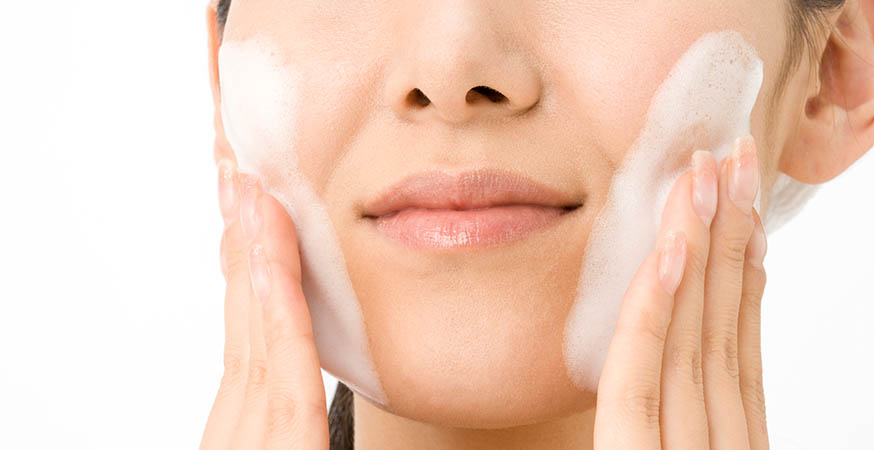When shopping for a good facial cleanser, you might be tempted to grab the latest craze that influencers or celebrities are promoting on their social media, or a product that looks so good you just can’t miss it. However, if you have sensitive skin, you need to be more mindful of what you put on your face.
Sensitive skin can be described as a skin type that unfortunately deals with a lot of irritation, redness, and breakouts. A common misconception is that only very pale and dry skin is sensitive, but that is not true. Anyone can have sensitive skin, regardless of if it’s oily, dry, normal, or combination, and skin tone does not play a part here either.
So, now that we know that, what should you look for in a perfect cleanser for sensitive skin?
What to Look For and Avoid
When choosing a good, reliable cleanser for sensitive skin, you want to make sure it won’t cause breakouts or cause irritation. It is also important to remember that you should avoid fragrances. Fragrances can irritate the skin and cause redness, so look for a product that is labeled as fragrance-free or unscented.
Choose a creamy cleanser, as it will be gentler on your skin and will not strip the natural oils or draw out moisture. Be sure to read the label and look for moisturizing ingredients such as hyaluronic acid. This acid is a perfect moisturizer because it works by attracting water to the skin, so it will work wonders for you. Additionally, look for cleansers that contain glycerin and ceramides, which can also boost the moisturizing properties of a face wash.
Even though you might be tempted to, avoid anti-aging ingredients and products with these properties. Things like glycolic acid or lactic acid will help battle the signs of aging, but they will also strip the natural oils from your skin and can cause irritation. If possible, it’s best to avoid them in your cleansing routine.
If possible, look for a product that is soap-free and parable-free, but contains good oils such as borage seed and sunflower, as well as aloe vera and cucumber, which help soothe the skin.
Ingredients you should absolutely avoid include alcohol, formaldehyde, urea, fragrances, salicylic acid (unless prescribed by a dermatologist for acne issues), essential oils (especially lavender and peppermint oil), formaldehyde, propylene glycol, witch hazel, beta hydroxy acids, and SLS (sodium lauryl sulfate).
Choosing a Cleanser for Sensitive Skin
Now that you know what to avoid, how do you choose the perfect cleanser? Easier said than done, right?
First, you should always read labels very carefully. Spending these extra minutes reading the ingredient list will help you choose the perfect product. Keep the list of forbidden ingredients in your phone so you can easily read them whenever you need.
Next, avoid products with exfoliating beads. Sensitive skin is, you guessed it, sensitive to a lot of rubbing and scrubbing, and you don’t need another abrasive ingredient irritating it.
Look for products that have the word sensitive or “formulated for sensitive skin” on the label. There are skincare brands on the market that deal specifically with sensitive skin, so ask around for the perfect one and make it your go-to.
You may also consider switching to pharmaceutical skincare products. Brands such as Bioderma, Noreva, and Uriage are formulated by dermatologists and chemists that specifically deal with medicinal-grade products.
Using a Cleanser for Sensitive Skin
If you have already found your perfect cleanser, it’s time to put it to good use!
You need to know when and how often to wash your face if your skin is sensitive. Be careful not to over-wash and strip your skin of its natural oils and moisture. It’s best to start washing your face once a day (in the evening) when you take off your makeup and get ready for bed. However, if you have oily, sensitive skin, you may repeat the same process in the morning as well.
When you get to the bathroom, use warm or cool water, never hot! Hot water will dry out your face, and we don’t want that. When you start, first splash your face with water to loosen up the dirt and makeup. Next, apply a pea-sized amount of cleanser to your fingers and rub your hands together. Then spread it on your face, massaging gently in circular motions, and avoiding the eyes.
Massage your face for about a minute or two and add more product if needed. After that, rinse thoroughly with warm or cool water, and avoid using a washcloth, as it will irritate your skin further and spread bacteria around. Pat your face dry with a clean, soft towel, and avoid rubbing your face.
Once you’re done, apply moisturizer to lock in all the water and let your skin refresh during the night. Before that, remove the makeup from around your eyes and any lipstick you may have. Here, you also want to aim for products formulated for sensitive eyes to avoid irritation and redness.
Addressing the Underlying Issue
You can use all the sensitive products in the world, wash your face with gentle cleansers, and apply the best moisturizers. However, if there is an underlying issue you are not addressing, your skin will never be calm.
Of course, some people just have regular sensitive skin (not overly dry or oily). However, if after all of this you still get redness and irritation, you might want to check with your dermatologist to see why your skin is so sensitive. Allergies and other dermatological issues may be present, so check with your doctor to find out the exact cause of the irritation.
